DS Automobiles DS 3 VS Hyundai Bayon – Specs, Efficiency & Price Comparison
Which model is the better choice – the DS Automobiles DS 3 or the Hyundai Bayon? We compare performance (156 HP vs 100 HP), boot capacity (350 L vs 411 L), efficiency (15.50 kWh5 L vs 5.40 L), and of course, the price (28300 £ vs 20100 £).
Find out now which car fits your needs better!
The DS Automobiles DS 3 (SUV) is powered by a Electric or Petrol MHEV engine and comes with a Automatic transmission. In comparison, the Hyundai Bayon (SUV) features a Petrol engine and a Manuel or Automatic gearbox.
When it comes to boot capacity, the DS Automobiles DS 3 offers 350 L, while the Hyundai Bayon provides 411 L – depending on what matters most to you. If you’re looking for more power, you’ll need to decide whether the 156 HP of the DS Automobiles DS 3 or the 100 HP of the Hyundai Bayon suits your needs better.
There are also differences in efficiency: 15.50 kWh5 L vs 5.40 L. In terms of price, the DS Automobiles DS 3 starts at 28300 £, while the Hyundai Bayon is available from 20100 £.
Compare all the key specs now and find out which model fits your lifestyle best!
DS Automobiles DS 3
The DS 3 stands out in the compact hatchback segment with its chic design and distinctive styling, making it a popular choice for those seeking a blend of elegance and individuality. Inside, the car boasts a premium interior that emphasizes comfort and cutting-edge technology, creating a delightful driving experience. With its agile handling and spirited performance, the DS 3 is not just about looks; it delivers on the road, ensuring a fun ride for enthusiasts and casual drivers alike.
details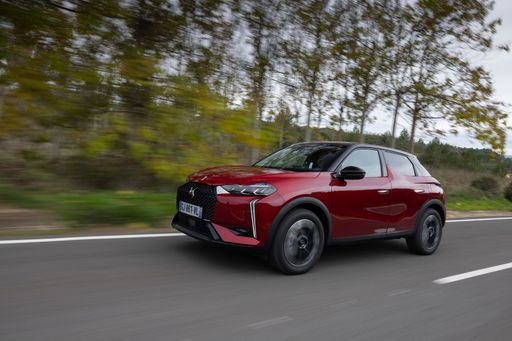 @ media.stellantis.com
@ media.stellantis.com
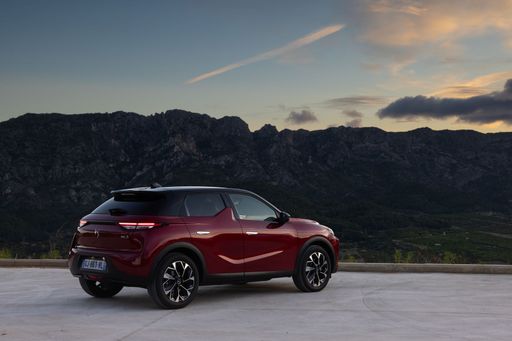 @ media.stellantis.com
@ media.stellantis.com
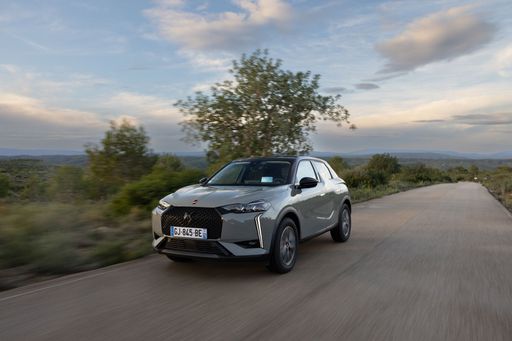 @ media.stellantis.com
@ media.stellantis.com
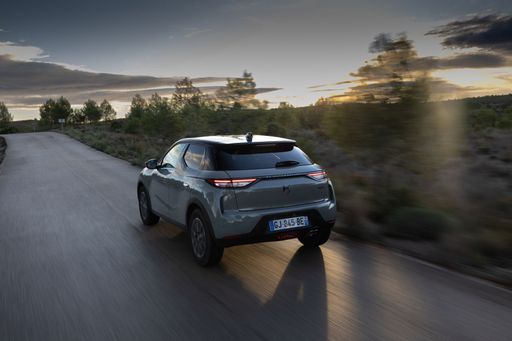 @ media.stellantis.com
@ media.stellantis.com
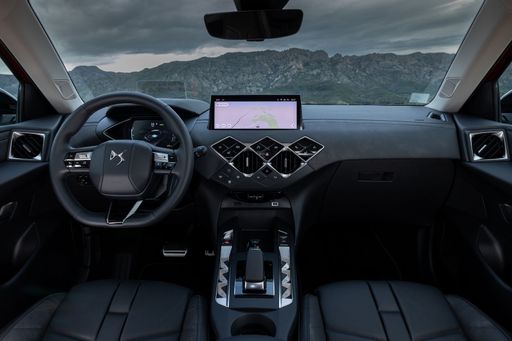 @ media.stellantis.com
@ media.stellantis.com
Hyundai Bayon
The Hyundai Bayon is a compact crossover that effortlessly merges practicality with modern design. Its sleek exterior and spacious interior make it an ideal choice for urban settings and longer journeys alike. With a focus on comfort and connectivity, this vehicle provides a smooth driving experience paired with advanced technology features.
details @ hyundai.news
@ hyundai.news
 @ hyundai.news
@ hyundai.news
 @ hyundai.news
@ hyundai.news
 @ hyundai.news
@ hyundai.news
 @ hyundai.news
@ hyundai.news

|

|
|
|
|
Costs and Consumption |
|
|---|---|
|
Price
28300 - 40500 £
|
Price
20100 - 25800 £
|
|
Consumption L/100km
5 L
|
Consumption L/100km
5.4 - 5.5 L
|
|
Consumption kWh/100km
15.50 kWh
|
Consumption kWh/100km
-
|
|
Electric Range
400 km
|
Electric Range
-
|
|
Battery Capacity
51 kWh
|
Battery Capacity
-
|
|
co2
0 - 112 g/km
|
co2
124 g/km
|
|
Fuel tank capacity
44 L
|
Fuel tank capacity
40 L
|
Dimensions and Body |
|
|---|---|
|
Body Type
SUV
|
Body Type
SUV
|
|
Seats
5
|
Seats
5
|
|
Doors
5
|
Doors
5
|
|
Curb weight
1249 - 1646 kg
|
Curb weight
1170 - 1195 kg
|
|
Trunk capacity
350 L
|
Trunk capacity
411 L
|
|
Length
4118 mm
|
Length
4180 mm
|
|
Width
1791 mm
|
Width
1775 mm
|
|
Height
1534 mm
|
Height
1500 mm
|
|
Payload
362 - 466 kg
|
Payload
460 - 465 kg
|
Engine and Performance |
|
|---|---|
|
Engine Type
Electric, Petrol MHEV
|
Engine Type
Petrol
|
|
Transmission
Automatic
|
Transmission
Manuel, Automatic
|
|
Transmission Detail
Automat. Schaltgetriebe (Doppelkupplung)
|
Transmission Detail
Schaltgetriebe, Automat. Schaltgetriebe (Doppelkupplung)
|
|
Drive Type
Front-Wheel Drive
|
Drive Type
Front-Wheel Drive
|
|
Power HP
145 - 156 HP
|
Power HP
100 HP
|
|
Acceleration 0-100km/h
9.1 - 9.2 s
|
Acceleration 0-100km/h
11.3 - 12.4 s
|
|
Max Speed
150 - 196 km/h
|
Max Speed
176 - 179 km/h
|
|
Torque
230 - 260 Nm
|
Torque
172 - 200 Nm
|
|
Number of Cylinders
3
|
Number of Cylinders
3
|
|
Power kW
107 - 115 kW
|
Power kW
74 kW
|
|
Engine capacity
1199 cm3
|
Engine capacity
998 cm3
|
General |
|
|---|---|
|
Model Year
2024 - 2025
|
Model Year
2024
|
|
CO2 Efficiency Class
A, C
|
CO2 Efficiency Class
D
|
|
Brand
DS Automobiles
|
Brand
Hyundai
|
DS Automobiles DS 3
An Overview of the DS 3: Style Meets Innovation
The DS 3, a standout model from DS Automobiles, continues to captivate automotive enthusiasts with its sophisticated design, advanced technology, and a range of powertrain options. This compact SUV strikes a perfect balance between luxury and practicality, making it a popular choice among city dwellers and adventure seekers alike.
Design and Comfort
The DS 3's exterior is characterized by its bold and dynamic lines, giving it an athletic stance on the road. With dimensions of 4118 mm in length, 1791 mm in width, and 1534 mm in height, the DS 3 exudes a confident presence. The distinctive grille and innovative LED lighting elements not only enhance its aesthetic appeal but also improve visibility during nighttime driving.
Inside the cabin, the DS 3 reflects the brand's commitment to luxury. High-quality materials and elegant finishes abound, creating a comfortable and immersive environment. With five seats and ample trunk space of 350 liters, the DS 3 is designed to accommodate both passengers and luggage effortlessly. The ergonomic layout of controls ensures drivers have a pleasurable experience behind the wheel.
Engine Options and Performance
The DS 3 offers a variety of powertrains, catering to different driving preferences and environmental considerations. The diesel variant, the DS 3 BlueHDi 130, delivers a respectable 130 HP and boasts a fuel consumption of just 5.2 L/100 km, making it an efficient choice for long-distance journeys. For those inclined towards petrol, the DS 3 MHEV 136 provides a punchy 136 HP while maintaining low emissions, making it suitable for urban driving.
Moreover, the electric DS 3 E-Tense is a game changer, generating 156 HP and featuring a range of up to 400 km on a single charge, thanks to its 15.5 kWh battery. This model reflects the industry's movement towards sustainable mobility without compromising on performance, with a 0-100 km/h acceleration time of just 9.1 seconds. The advanced automatic gearbox across all variants ensures smooth and efficient transitions between gears, enhancing the overall driving experience.
Innovative Technology and Features
Incorporating cutting-edge technology, the DS 3 is equipped with an array of features designed to enhance safety and connectivity. The infotainment system is intuitive and supports various connectivity options, enabling drivers to stay connected on the go. Advanced driver-assistance systems, including adaptive cruise control and lane-keeping assist, make the driving experience not just enjoyable but also safer.
Additionally, the vehicle's CO2 efficiency ratings vary by model, with the E-Tense version achieving an impressive 0 g/km, making it the ideal choice for eco-conscious drivers. The attention to detail in both design and technology showcases DS Automobiles' dedication to providing a premium automotive experience.
Conclusion: The Future of Urban Mobility
Overall, the DS 3 stands out in the crowded compact SUV market with its combination of stylish design, innovative technology, and versatile powertrain options. Whether you are looking for a fuel-efficient diesel, a smooth petrol hybrid, or a fully electric experience, the DS 3 manages to cater to diverse preferences while maintaining an upscale feel. As automotive development moves towards sustainability, the DS 3 is well-positioned to remain a top contender in urban mobility solutions.
Hyundai Bayon
Introducing the Hyundai Bayon: A New Era in Compact SUVs
The Hyundai Bayon, a compact SUV designed with urban adventurers in mind, is making waves with its exceptional blend of style, performance, and technology. The brand has pulled out all the stops to ensure that the Bayon stands out in the crowded SUV market, offering a vehicle that is both practical and innovative.
Sleek Design and Cutting-Edge Aerodynamics
The Bayon features a striking exterior design, characterised by its bold lines and angular shapes. With a length of 4180 mm, a width of 1775 mm, and a height of 1500 mm, the Bayon commands attention with its modern appeal and aerodynamic efficiency. These dimensions not only contribute to its sleek design but also enhance fuel efficiency, achieving an impressive 5.4 L/100 km.
Engine Performance and Specifications
Under the bonnet, the Bayon is powered by a 1.0-litre T-GDI petrol engine, delivering a robust 100 PS or 74 kW. This engine is available with either a manual or automatic gearbox, meeting varied driver preferences. The front-wheel-drive system complements its urban-centric design, ensuring a smooth and responsive ride.
Maximised Interior Space and Comfort
The spacious interior of the Bayon accommodates up to five passengers comfortably. The vehicle boasts a boot space of 411 litres, perfect for both everyday use and weekend getaways. The cabin is designed with practicality and technology in mind, with intuitive controls and ample storage options.
Advanced Technology and Connectivity
Hyundai has equipped the Bayon with state-of-the-art technology to enhance the driving experience. The SUV features a high-resolution touchscreen, offering seamless connectivity with Apple CarPlay and Android Auto. Safety is also a priority, with multiple driver assistance systems including lane-keeping assist and forward collision avoidance assist.
Environmental Efficiency
Despite its powerful performance, the Bayon achieves a respectable CO2 efficiency class of D, with emissions as low as 122 g/km. This balance between performance and environmental responsibility makes the Bayon an attractive option for conscientious drivers.
Affordability and Market Appeal
The Hyundai Bayon is competitively priced, ranging from €22,900 to €29,600. Its affordable running costs, estimated at 32.3 to 36.4 cents per kilometre, further enhance its appeal to budget-conscious consumers. With monthly costs ranging from €806 to €909, the Bayon provides excellent value without compromising on features or performance.
Final Thoughts
The Hyundai Bayon truly stands out in the compact SUV segment, combining style, innovation, and practicality in an appealing package. It offers a versatile driving experience suited to the demands of modern urban living, making it a top contender in its class. As Hyundai continues to champion forward-thinking design and technology, the Bayon is a testament to the company's ongoing commitment to excellence.
The prices and data displayed are estimates based on German list prices and may vary by country. This information is not legally binding.
